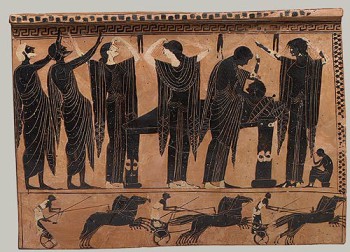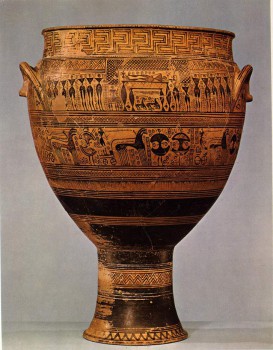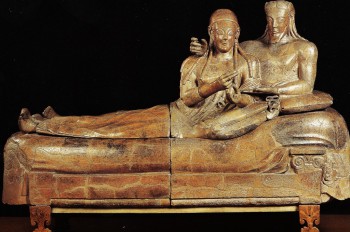Ancient Worlds: Remembering the Dead

Maybe it’s just where I live, but this seems like the perfect time of year to celebrate a holiday dedicated to spooky things. The days are short and cold, the trees are almost bare, and the nights are long and dark. And cold.
Did I mention I live in Wisconsin?
From here, it’s a slide into six months of winter and we all turn into Starks, wandering around looking darkly at the sky and muttering, “Winter is Coming.” So to us, it seems like this is the almost inevitable time to celebrate the memory of the dead. The popularity of Halloween has led many of us to see this as a natural and widespread association.
It may strike us as surprising then that this association is nowhere near universal. The origins of our Halloween are murky at best and probably syncretic, tying together British Isles traditions with Catholic veneration of the saints.
So when did the Greeks and Romans celebrate their dead?
Actually, that’s a more difficult question to answer than you might think. We tend to generalize a lot about the Ancient Mediterranean; when in reality, we’re talking about almost two-thousand years of history over several distinct cultural and ethnic groups. To put it another way, just how much does your Christmas resemble December 25th, 600 AD? In the Mississippi valley?

But we can generalize in some ways. Both cultures did honor their ancestors and both had festivals that involved bringing offerings to the graves of the deceased.
In Athens, this took place during the Anthesteria in February. In spite of the difference in season, the event looks a little bit like Halloween: the dead were believed to walk around, there were celebrations that involved drinking (a lot of drinking; it was a festival of Dionysus, after all), and people put out food offerings for the departed.
Not so much like we do it: at various times in Greek history, tubes were actually built down into the graves so that food and drink could be poured down.
I don’t know why I find that so profoundly creepy, but it gives me the willies. What if you poured down a particularly good vintage and heard someone call back, “Thank you”?
The Romans had two celebrations commemorating the dead. The first, the Parentalia, was a nine-day celebration in February remembering the protective spirits of each family. (What can I say? For the Romans, the line between ‘ancestors’ and ‘little gods’ gets awfully blurry. Which is how you end up with Julius Caesar becoming a god.) During this festival, Ovid tells us that floral garlands, food, and drinks were laid at family tombs.

The flip side of the Parentalia, which celebrates friendly dead, was the Lemuria. This festival occurred in May and was dedicated to lemures, or hungry ghosts. These were spirits who had gone unfed and unremembered, and were now angry. So once a year, you had to exorcise them.
Part of spring cleaning, I guess.
How did they do this?
Black beans.
No, really, can’t make this up. A member of the household would walk around the property and throw beans over their shoulders to banish the evil spirits until the next year. Oddly, beans have a long-standing relationship in the ancient world with the dead.
I would judge, but we think kissing under a poisonous parasitic plant is cute.
And that’s the point, I suppose. Death, and the dead, are terrifying. Our minds have great difficulty grappling with the idea of them and we wrap them in tradition and ritual to make them more comfortable. And any wrapping we put on that is going to look strange. Especially after two-thousand years.
I can’t help but wonder, after all, if it’s our own culture’s refusal to grapple with death that leads us to take Halloween so far away from remembering our own ancestors.
This week, we’ve strayed a bit afield. I hope you’ll forgive me on the grounds that the black bean thing will make you the hit of your next cocktail party. You may even win bar trivia with it! I’ll be back on topic in two weeks, when we return to Odysseus’s long, strange trip.
Living just on the western side of the Mississippi over here in Minnesota, I think your description of Hallowe’en and the ensuing coming of winter nailed it perfectly.
Some fascinating facts; thanks for sharing them!
Glad you enjoyed them!